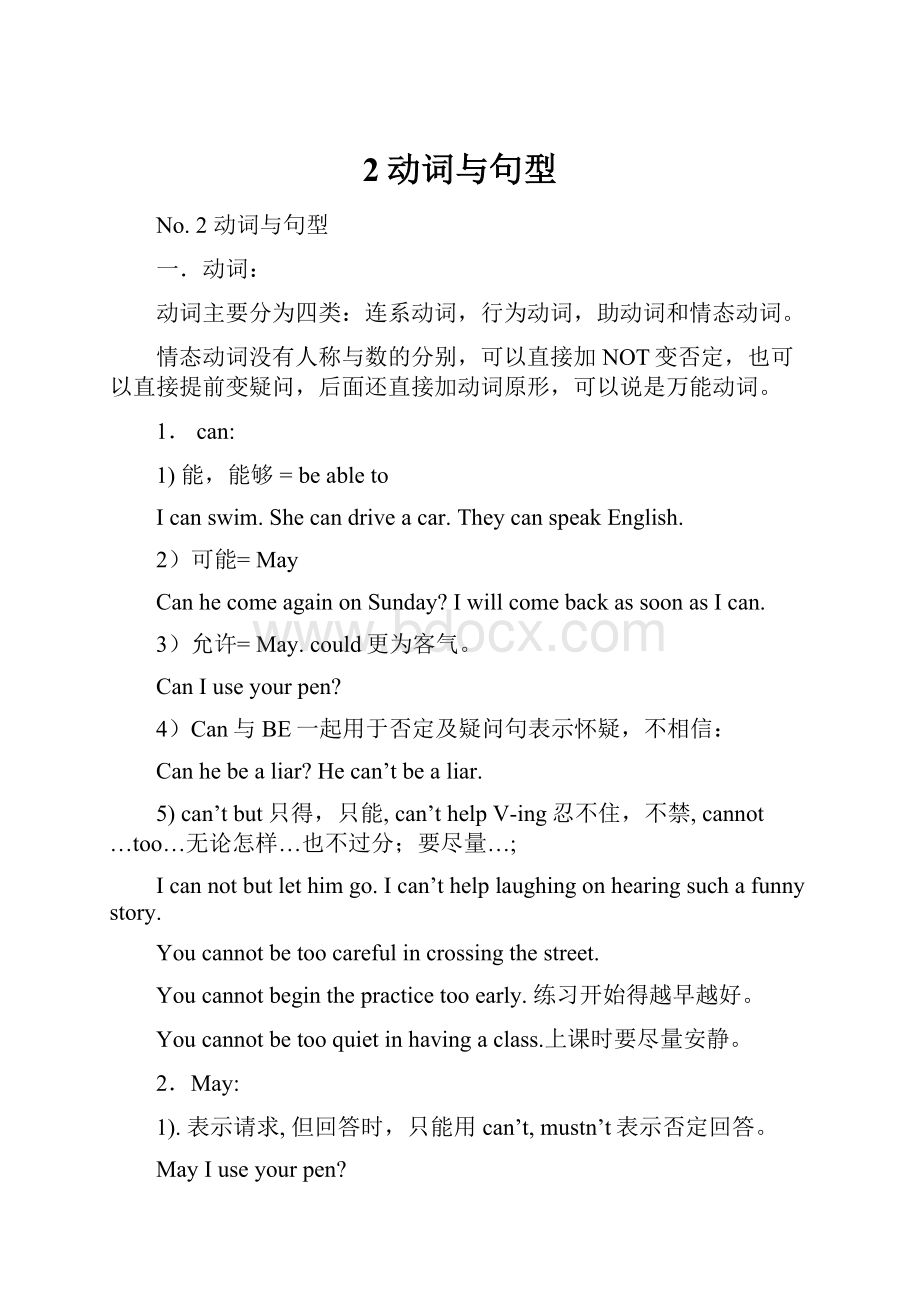2动词与句型.docx
《2动词与句型.docx》由会员分享,可在线阅读,更多相关《2动词与句型.docx(9页珍藏版)》请在冰豆网上搜索。

2动词与句型
No.2动词与句型
一.动词:
动词主要分为四类:
连系动词,行为动词,助动词和情态动词。
情态动词没有人称与数的分别,可以直接加NOT变否定,也可以直接提前变疑问,后面还直接加动词原形,可以说是万能动词。
1.can:
1)能,能够=beableto
Icanswim.Shecandriveacar.TheycanspeakEnglish.
2)可能=May
CanhecomeagainonSunday?
IwillcomebackassoonasIcan.
3)允许=May.could更为客气。
CanIuseyourpen?
4)Can与BE一起用于否定及疑问句表示怀疑,不相信:
Canhebealiar?
Hecan’tbealiar.
5)can’tbut只得,只能,can’thelpV-ing忍不住,不禁,cannot…too…无论怎样…也不过分;要尽量…;
Icannotbutlethimgo.Ican’thelplaughingonhearingsuchafunnystory.
Youcannotbetoocarefulincrossingthestreet.
Youcannotbeginthepracticetooearly.练习开始得越早越好。
Youcannotbetooquietinhavingaclass.上课时要尽量安静。
2.May:
1).表示请求,但回答时,只能用can’t,mustn’t表示否定回答。
MayIuseyourpen?
Yes,youmay.
No,youcan’t.或:
No,youmustn’t.
2).表示可能:
HemaycomebackonSunday.
3).May与Be一起,表示把握不大的猜测:
Hemaybeathomenow.
4).mayaswell=mightaswell:
不妨,还是…为好。
Shallwewalkortakeabus?
Wemayaswellwalk.
Wemight(just)aswellwalk.
5).maywell=havegoodreasons是有理由的。
Youmaywellrefusehim.
6).表示祝愿:
Mayyousucceed.
Mayyouhaveagreatholiday.
3.Must:
1).表示“必须”,常为主观看法。
而haveto为客观要求。
Youmuststudyhard.
IhavetostudyhardbecauseIwilltakeanexamnextweek.
2).mustn’t表示“禁止,不允许”:
Youmustn’ttalkwhiletheteacherisgivingalecture.
3)对于以must提问的一般疑问句,否定应用needn’t代替。
MustIdoitnow?
Yes,youmust.No,youneedn’t.
4).Must与be一起在肯定句中表示把握极大的可能:
Hemustbeathomenowbecauseheissickinbed.
4.Should与oughtto:
(义务,劝告,责任)应该
Youshouldstudyhardinordertogethighmarksinthefinals.
Yououghtnottoplaywithhim,becauseheisaverydirtyboy.
Oughtwedoitrightnow?
5.wouldrather宁肯,宁愿
Iwouldratherbuyanewone.
Iwouldratherwalktherethanwaithere.
6.hadbetter最好
You’dbetterleavethedogalone.
We’dbettertellherthetruth.
7.情态动词与完成式:
1).CanhaveV-ed2表示对过去行为的怀疑或不肯定:
Canhehavefinishedtheexercises?
Hecan’thavemadesuchamistake.
2).mighthaveV-ed2表示对过去行为把握不大的猜测,mighthaveV-ed2有时还带有责备的意味:
Itmayhavebeentrue.
Youmighthavefinisheditearlier.
3).MusthaveV-ed2表示对过去行为把握极大的猜测;needn’thaveV-ed2本来不必做…
ShemusthavestudiedEnglishbefore.
Youneedn’thavecomeoveryourself.
4).shouldhaveV-ed2,shouldn’thaveV-ed2表示对过去应该做而未做,或不该做而做了的行为的责备:
Theyshouldhavemadeagoodjobofit.
Youshouldn’thavetoldherthetruth.
MultipleChoice:
1.Billtoldmethat____livewithhisroommatesagainnextyear.
A.he’drathernotB.hewon’tratherC.he’llratherD.he’dratherdidn’t
2.He___beinBeijingbecauseIsawhiminthelibraryonlyafewminutesago.
A.mustn’tB.can’tC.maynotD.isn’tableto
3.___youtellmewhathashappened?
A.MayB.MustC.CanD.Could
5.DoIhavetogetbackthisevening?
–No,you___.
A.needn’tB.maynotC.can’tD.mustnot
6.SusanandIcangotothelecture,___.
A.butneithercanCharlesB.andsoCharlescanC.butCharlescan’tD.andCharlesalsocan
7.“Thatmustbeamistake.”–“No,it___amistake.”
A.mustnotbeB.needn’tbeC.cannotbeD.wouldnotbe
8.You___bemorecarefulnexttime.
A.havetoB.mayC.mustD.hadto
9.___IwaterthetreesonTuesday?
–No,youneedn’t.
A.CanB.MustC.MayD.Shall
10.It___raintomorrow.
A.canB.mustC.shouldD.may
11.Thewheelsofhistory___notbeturnedback.
A.canB.shallC.needD.may
12.___youbehereateighto’clocktomorrowmorning?
A.WouldB.ShouldC.CanD.Could
13.___Ihaveatalkwiththemanagernow?
A.WillB.DidC.MayD.Can
14.Didyourbrotherbreakthewindow?
--He___havedoneit.
A.willnotB.isC.mayD.can
15.Sinceitisalreadymidnight,we___.
A.hadbetterleavingB.oughttohaveleaveC.shouldtakeourleaveD.mightaswellleave
16.Shedoesn’tanswerthedoorbell.She___beasleep.
A.oughttoB.mightC.musthaveD.should
17.___youbehappy!
A.MayB.CanC.MustD.Would
18.We___bookatable___therestaurantwon’tbefullthisevening.
A.mustn’tB.can’tC.needn’tD.don’t
19.Weshall___hurryifwearegoingtocatchthe12:
00train.
A.mustB.needC.necessaryD.haveto
20.You___atonce.
A.hadbettertogoB.hadbettergoC.hadtogobetterD.hadbettergone
21.I____mewhathappened.
A.wouldlikeyoutellB.wouldlikeyoutotellC.wouldlikeyoutellingD.wouldlikeyouthatyoutell
22.Myfather___suchathing.
A.cannotsayB.couldn’tsayC.maynotsayD.cannothavesaid
23.Ididn’tseehimatthelectureyesterday.He___.
A.mustn’tattendB.cannothaveattendedC.wouldhavenotattendedD.needn’thaveattended
24.Hewentonfoot,buthe___bybus.
A.mightofgoneB.shouldgoneC.couldhavegoneD.oughttohavegone
25.She___foryesterday’stest,butshedidn’t.
A.shouldhavestudiedB.wouldstudyC.mightbestudyingD.musthavestudied
26.I___tellherthetruth.
A.cannothelpB.cannotbutC.maynothelpD.couldbut
27.Iwasn’tsupposedtogotothemovies,butI___myself.
A.cannothelpB.couldn’tbutC.hadtohelpD.couldn’thelp
28.Hebegantowriteit2hoursago.He___havefinishedthearticlenow.
A.mightB.oughtC.oughttoD.hadto
29.He___liveinthecountrythaninthecity.
A.prefersB.likesbettertoC.hadbetterD.wouldrather
30.TheyaskedTomtogivehimadrink,buthe___.
A.hadn’tB.wasn’tC.wouldn’tD.shouldn’t
二.句型
(一)英语的句子可以根据结构分成简单句,并列句和复合句。
1.简单句可以分成五种基本句式。
2.并列句依据逻辑关系,可以用and(顺连),but(转折),so(结果),or(选择),for(原因)来连接。
Heworksinabigcompanyandhelikeshisjobverymuch.
Heworksveryhard,butthebossdoesn’tlikehimverymuch.
Theweatherwashot,sosheboughtanair-conditioner.
Hemustbearichman,forhewearsaveryexpensivewatch.
Youmusttellmethetruth,orIwillnevertalktoyouagain.
3.复合句可依照语法作用分成名词性从句,形容词性从句及副词性从句。
名词性从句分为四种:
主语从句,宾语从句,表语从句及同位语从句。
形容词性从句即定语从句。
副词性从句即状语从句。
(二)根据用途,英语的句子又可以分为陈述句,疑问句,感叹句及祈使句。
1.陈述句:
用来陈述一件事实,分为肯定句和否定句。
Icomefromthenorth.Hedoesn’tspeakEnglish.
2.疑问句:
分为一般疑问句,特殊疑问句,选择疑问句及反意疑问句。
一般疑问句又叫Yes-No问句,用动词提问,用yes,no回答:
AreyouChinese?
Yes,Iam.No,Iamnot.
Didyouliveherelastyear?
Yes,Idid.No,Ididn’t.
选择疑问句前半部用一般疑问句,后半部用OR连接供选择的并列部分,回答时不用YES-NO:
Issheateacherorastudent?
Sheisateacher.Sheisastudent.Neither.Sheisadoctor.
反意疑问句分成两部分:
如果前句用肯定句,后句就用否定疑问;如果前句用否定句,后句就用肯定疑问.但无论哪种形式,回答时都按实际情况用YES,NO回答:
Youaren’tateacher,areyou?
Yes,Iam.
ShecanspeakEnglish,can’tshe?
No,shecan’t.
特殊疑问句用“疑问词+一般问句”的形式提问,回答时直接用肯定句回答。
常用的问词有:
who,whose,whom,what,when,where,why,which,andhow.
Whotoldyouthenews?
Whomdoyoulikebest?
Whosecaristhat?
Whatdidshestudyyesterday?
WhathadshedonebeforeIcamein?
Wheredidyoufindyourbike?
……
3.感叹句:
分为感叹名词和感叹形容词/副词两种。
感叹名词:
What+(a)+Noun+S+V!
Whatanicegirlsheis!
Whatkindpeopletheyare!
感叹形容词/副词:
How+adj./adv.+S+V!
Howniceitis!
Howhardtheyareworking!
4.祈使句:
分为肯定和否定两种。
肯定:
V原形+其他,please.
Comeinplease.Pleasecomein.
否定:
Don’t+V原形+其他,please.
Don’tdothat,please.
Pleasedon’ttalkinclass.
练习:
按要求转换句型。
1.Shehasknownthetruth.(变否定)
2.Theyplantedalotoftreeslastyear.(变一般疑问句)
3.Theyhave2children.(对划线部分提问)
4.WestudyEnglishhardbecauseitisthemostusefullanguageintheworld.(对划线部分提问)
5.Shelikesmeat.(用orfish变选择问句).
6.Youwenttotheparty.(变反意疑问句)
7.Shehasabigcar.(对划线部分感叹)
8.Herunsfast.(对划线部分感叹)
9.Pleaselethimgo.(变否定)
10.HassheeverbeentotheUSAbefore?
(还原成肯定句)
1.Hecanplaybasketball.变否定
2.Theyboughtanewcarlastweek.变一般疑问句
3.Hehasfoundhiscar.对划线部分提问
4.Theyoftenhelpyou.变反意疑问句
5.Pleasetellhimthenews.变否定
6.HelivesinBeijing.(用orinShanghai变选择问句)
7.Theyhavealovelybaby.对划线部分感叹
8.Heworkshardatschool.对划线部分感叹
9.Theymusthelpyou.变一般疑问句
10.ShewillgotoBeijingbyplane.对划线部分提问